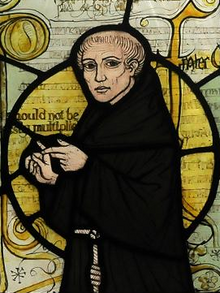William of Ockham
| William of Ockham | |
|---|---|

William of Ockham depicted on a stained glass window at a church
|
|
| Born | 1285 Ockham, Surrey, England |
| Died | 1347 Munich, Bavaria, Holy Roman Empire |
| Era | Medieval philosophy |
| Region | Western philosophy |
| School |
Scholasticism Voluntarism Nominalism |
|
Main interests
|
Metaphysics, epistemology, theology, logic, ontology, politics |
|
Notable ideas
|
Occam's razor, nominalism |
|
Influences
|
|
|
Influenced
|
|
William of Ockham (/ˈɒkəm/; also Occam, from Latin: Gulielmus Occamus;c. 1287 – 1347) was an English Franciscan friar and scholastic philosopher and theologian, who is believed to have been born in Ockham, a small village in Surrey. He is considered to be one of the major figures of medieval thought and was at the centre of the major intellectual and political controversies of the fourteenth century. He is commonly known for Occam's razor, the methodological principle that bears his name, and also produced significant works on logic, physics, and theology. In the Church of England, his day of commemoration is 10 April.
William of Ockham was born in Ockham, Surrey in 1285 and joined the Franciscan order at an early age. It is believed that he studied theology at the University of Oxford from 1309 to 1321, but while he completed all the requirements for a master's degree in theology (the English 14th century equivalent of a doctorate), he was never made regent master. Because of this, he acquired the honorific title Venerabilis Inceptor, or "Venerable Beginner" (an inceptor was a student formally admitted to the ranks of teachers by the university authorities).
During the Middle Ages, theologian Peter Lombard's Sentences (1150) had become a standard work of theology, and many ambitious theological scholars wrote commentaries on it. William of Ockham was among these scholarly commentators. However, Ockham's commentary was not well received by his colleagues, or by the Church authorities. In 1324, his commentary was condemned as unorthodox by a synod of bishops, and he was ordered to Avignon, France, to defend himself before a papal court.
...
Wikipedia
